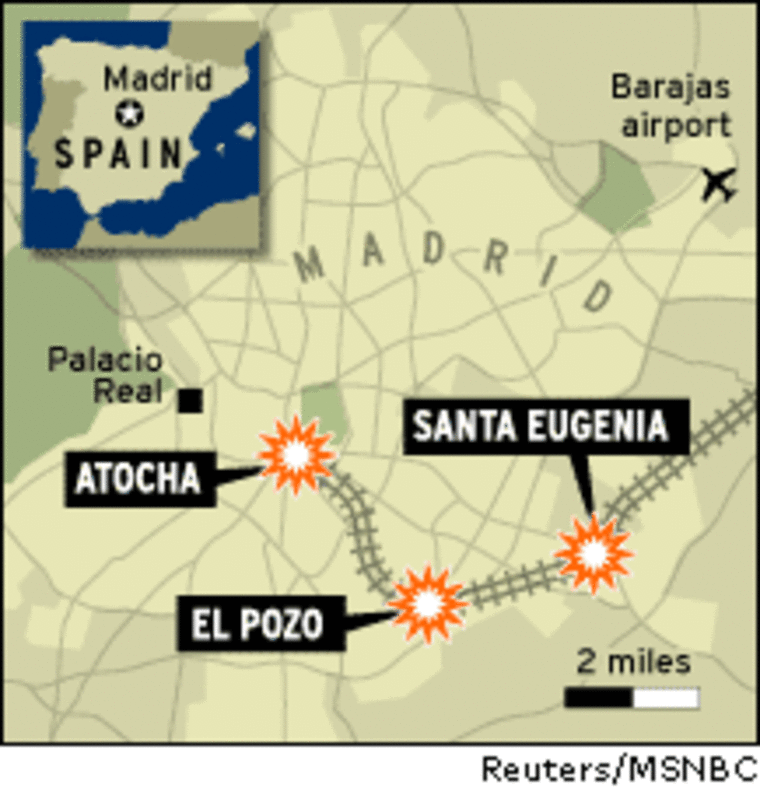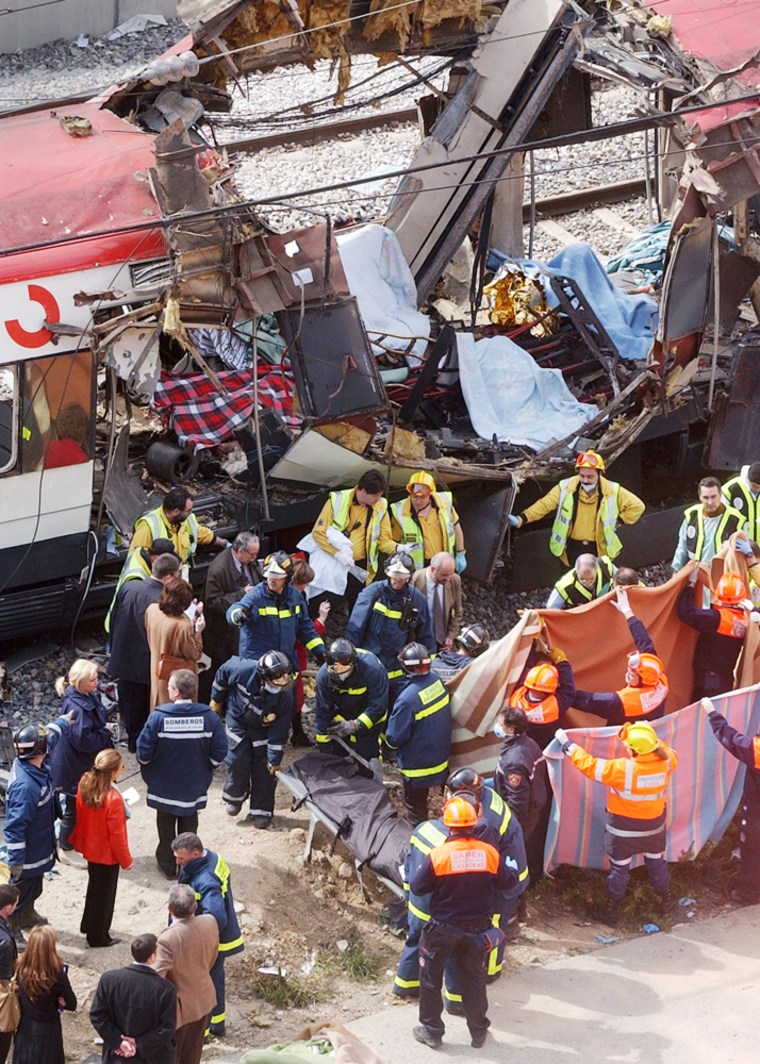Almost immediately after Thursday's murderous bombings in Madrid, Spanish officials pointed fingers at a group that has frequently resorted to terror tactics in the past: the Basque separatist guerrillas of ETA.
Founded in 1959 to win independence for the Basque region of northeastern Spain, ETA previously had not engaged in such massive acts of terror, generally confining its actions to smaller car bombs and assassinations directed at specific Spanish politicians, judges or generals. Nonetheless, the group, whose acronym stands for “Basque Fatherland and Liberty,” has a long history of deadly attacks and was a charter member of the U.S. State Department’s list of terrorist groups.
This apparent disconnect led some Thursday to speculate that Islamic terrorist groups might be behind the blasts, perhaps striking a blow at Spain for its decision to support the U.S.-led invasion of Iraq, or angered by the fact that Spain has arrested more alleged al-Qaida operatives than any European country outside Germany and France. Certainly, viewed from the perspective of al-Qaida, a group that dwells on perceived injustices centuries past, striking at the nation that drove the Moors from Europe in 1492 would not be hard to justify.
Not just Islam
Whatever the final conclusion, the attacks and the quick and public decision to blame ETA drive home a point often lost in the post-9/11 world: Some of Europe’s own home-grown extremist groups — whether nationalist, socialist or fascist — have not relinquished their demands just because the world’s definition of terrorism has changed.
“These nationalist groups make so much less sense these days because of the process of European integration that is going on,” says Radek Sikorski, head of the New Atlantic Initiative division of the American Enterprise Institute, a Washington think tank. “But just because their cause is a thing of the past does not mean they are gone altogether.”
Three events — the end of the Cold War in 1989, the accelerated integration and expansion of the European Union that began in 1991, and the attacks on the United States of September 2001 — all have served to undercut the nationalist, leftist and fascist groups that regularly perpetrated terrorist attacks across Europe in the 1960s, 1970s and 1980s.
The first wave of these groups to wither and die were those most directly dependent for support from the Soviet Union and its communist satellites in Eastern Europe. Among them, the Red Army Faction in Germany, the Red Brigade in Italy and Direct Action in France. Freelancers like Carlos “The Jackal” Sanchez, a Venezuela-born bomber who let himself out to the communist security services of East Germany and Czechoslovakia, found themselves without a sponsor. For the most part, these groups are defunct, and, like Sanchez, were tracked, tried and jailed.
The nationalist card
Nationalist groups like ETA, however, were less affected by the Cold War’s sudden end. Violent groups fighting to oust the British from Northern Ireland, the French from Corsica, the Turks from Kurdish lands and the Spanish from the Basque lands generally could depend on local support, whether genuine or as a result of protection rackets and bank robberies.
But European integration and a general maturation of the post-World War II political order in Europe have slowly cut the support base for these groups and for others less well known representing France’s Breton population, Spain’s Galacians, Greece’s Muslim and Slavic minorities and even Scottish and Cornish nationalists in Britain.
“It really is eccentric in an age of a borderless Europe to be killing for separatism,” says Sikorski, a former deputy Polish defense minister and an authority on European nationalism. “People in Europe simply have other concerns and problems these days.”

In Northern Ireland, for instance, the Irish Republican Army’s ties to American sympathizers and financing allowed it to survive the loss of Soviet bloc aid and Libyan training bases just long enough to bring the British government to the peace table in the late 1990s.
The peace process there is strained, and the “national unity” style government of Protestant unionists and Catholic nationalists that is supposed to rule the province has had to be suspended several times because of alleged IRA violations of the pact.
Yet the outright warfare that raged for several decades beginning in the late 1960s has disappeared, and the resulting stability appears to have stolen legitimacy from the violent groups on both sides in the eyes of the local population. The September 2001 attacks, too, helped convince the IRA that terrorism — at least in the eyes of its American allies — would no longer be tolerated.
In France, two groups continue to conduct bombings and assassinations on the French island of Corsica, as well. The best known, the National Liberation Front, or Frente Corsu di Liberazion, are dedicated to the independence of the island, whose natives look to Italy and not France as their cultural model.
Paris has shown little appetite for relinquishing the birthplace of Napoleon, however, and so a low-level war, primarily aimed at retarding the island’s tourist trade and discouraging “transplants” from France, continues.
Basque-et case?
In some ways, the Basque case is unique in that it has proven so immune to developments outside of Spain.
Like most European nations, Spain is really a collection of smaller kingdoms and duchies — Castille, Galacia, Catalonia, for instance — which over time came to be governed from Madrid by Spain’s ruling family.
The Basques, ensconced in the rugged Pyrenees and fiercely resentful of Madrid’s incursions, have resisted “Spanification” more than most. They are, ethnologists say, among Europe’s oldest ethnic groups, and their language is related to no other.
Polls suggest a majority of Basques do not support ETA’s violent ways, or even the less strident separatist agenda of ETA’s political wing, Batasuna. The party is currently banned in Spain, but in the past it has won enough votes to take part in the coalition governments that generally govern the Basque region.
Yet efforts to find a negotiated solution to the Basque conflict have failed repeatedly. Following the success of the Northern Irish peace process in the late 1990s, the leader of the IRA’s political wing, Gerry Adams, used his influence with ETA leaders to encourage them to announce a cease-fire and sue for terms similar to those Irish nationalists won.
The process broke down, however, with ETA accusing the Spanish government of inflexibility and Spain alleging that ETA guerrillas had repeatedly broken the cease-fire. With the arrest of two senior ETA leaders by France last year, a fissure appears to have opened inside the group over the question of restarting a concerted bombing campaign.
The Spanish supposition
Spanish officials appear relatively certain that this is the dynamic that may explain the ferocity of Thursday’s attacks.
“You could speculate about Arab terrorism, and it won’t be ruled out,” one official told MSNBC.com. “But there is nothing pointing away from ETA. We know there are some inside the group who have wanted to strike us hard. For now, this is the dominant theory.”
This official cited several factors that point toward ETA:
- Spain’s general election, just three days away, looked likely to confirm as the next prime minister Mariano Rajoy, the hand-picked successor to conservative Jose Maria Aznar, who halted talks with ETA and has led a crackdown on the group.
- ETA is in the midst of an internal struggle over whether to pursue talks with the government or return to an all-out bombing campaign. Such internal fissures within guerrilla organizations, especially during periods when peace talks have stalled, often lead to escalations in the scope of attacks aimed at derailing talks permanently — a phenomenon seen during the Northern Ireland peace talks in the late 1990s.
- Spanish interior ministry officials say that over the past several months, as Spain’s general election campaign has raged, security officials have foiled four previous ETA attempts to hit at Madrid, including the interception of a van filled with over 1,000 pounds of explosives just 12 days ago.The types of explosives involved — relatively small and placed in multiple locations — are consistent with past ETA blasts.
“If ETA hoped to affect the election, they would be not just criminal but very foolish,” says Sikorski. “Acts of terror like that always rebound against the perpetrators, and I think it would have precisely the opposite reaction in the election — just as is always the case when terrorists do similar things in Israel or Russia.”
